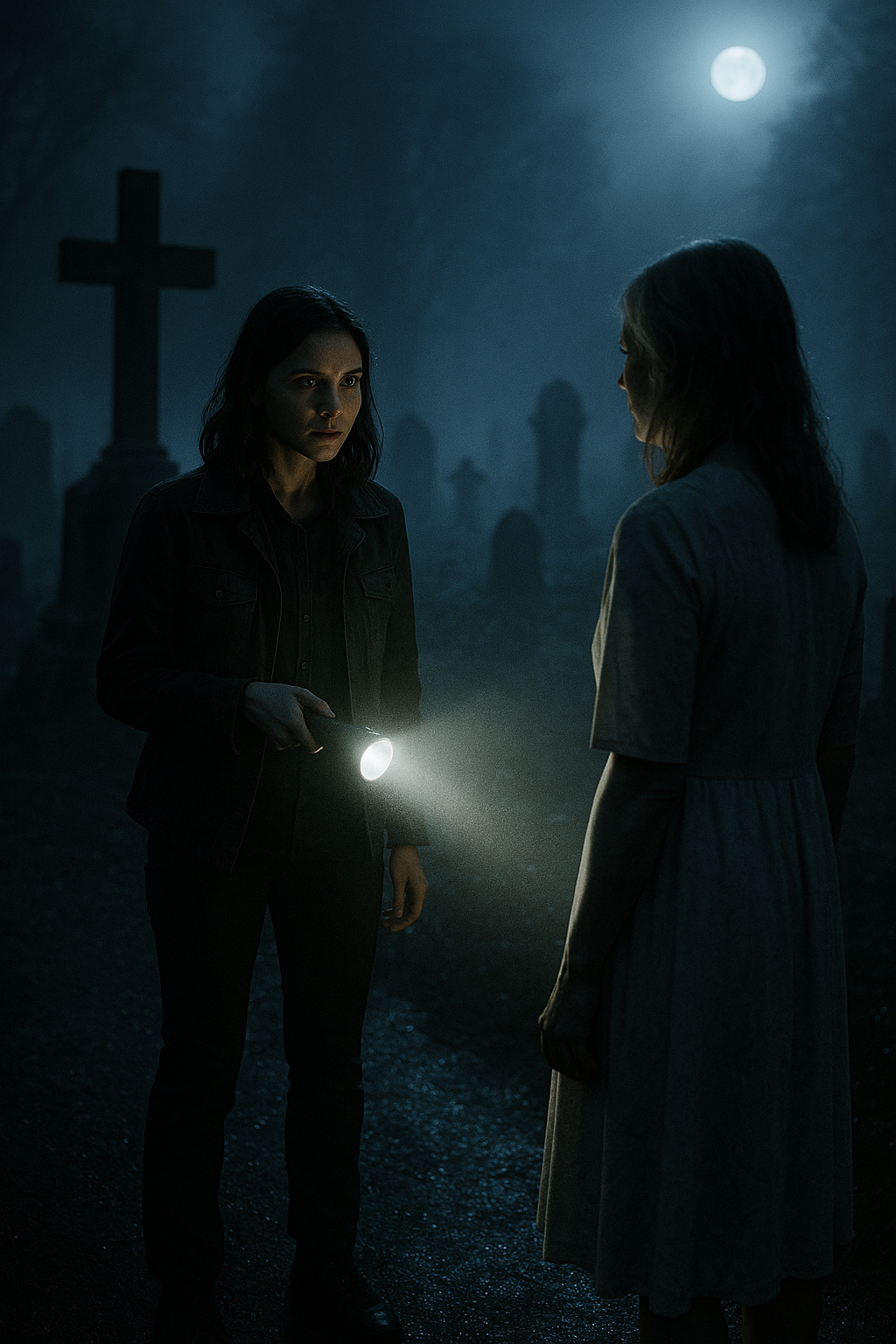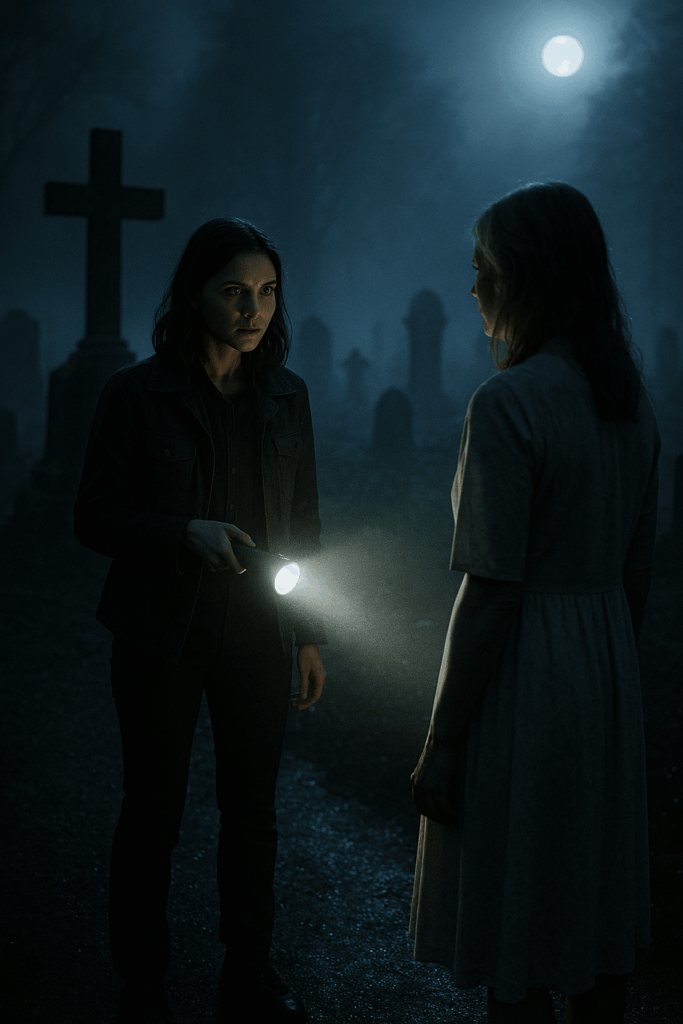The rain started before dawn — heavy, cold, merciless. It felt like the sky was grieving with me. By the time we lowered the casket, my clothes clung to my skin, my fingers numb around the wilted white rose I couldn’t bring myself to throw. Everyone spoke in hushed voices, offering polite condolences, but all I could hear was the rhythmic thud of soil hitting the coffin. Each sound felt like a nail sealing her memory away forever.
My mother — Helen Carter — was gone. And my father wasn’t even there to say goodbye. He was 3,000 miles away in Cancún, posting smiling photos with his new girlfriend, champagne glasses in hand. The caption read:
“New beginnings.”
That post went live twenty minutes before the funeral started. I stood there, soaked and shaking, staring at the photo on my phone until the screen blurred with rain and tears. I wanted to scream, to throw the phone into the mud, to unsee everything.
But grief has a way of numbing even rage.
That night, I sat in my apartment, lights off, the silence so thick I could hear my own heartbeat. My mother’s old scarf — pale lavender — was draped over the arm of the couch.
It still smelled faintly of her perfume. When my phone buzzed, I didn’t even look up at first.
Then I saw the name: Mom. I froze.
The contact photo — her smiling face — lit up the dark room For a second, I couldn’t breathe. Then the message appeared.
“I’m not dead. Come to the cemetery. Now.”

Everything inside me turned to ice.
It wasn’t possible. It couldn’t be. But the number was hers. The one I hadn’t been able to delete from my contacts. The one still linked to the last voicemail she’d left me:
“Don’t worry about me, Ava. I’ll see you soon.”
I grabbed my keys before I could think. Rain pounded the windows. My heart thudded in my throat. As I drove, my headlights carved pale paths through the fog, the wipers struggling to keep up. I told myself it was a prank. Some sick joke. But another part of me — the part that still reached for her every morning — whispered, What if it isn’t?
By the time I reached the gates, it was close to midnight. The iron bars creaked in the wind. Fog curled around the headstones, rolling low like breath on glass.
“Mom?” I called out, stepping through. My voice sounded small, swallowed by the rain.
Then, movement — near the old willow tree that marked her grave. A figure. Thin, hunched, wearing a long coat. I lifted my flashlight — and my world stopped.
Her.
Her face, pale and wet, but hers. Those same hazel eyes. The faint scar by her temple. Her lips trembled. “Ava,” she whispered, her voice thin as smoke. “It’s me.”
My flashlight slipped from my hand. I ran to her. Her arms wrapped around me — cold, trembling, real.
“Mom,” I sobbed. “How—how are you alive?”
She pulled back, glancing over her shoulder. “We don’t have much time. They’re watching.”
“Who?”
“Your father,” she said, her voice breaking. “And the people he works for.”
We sat in my car, heater blasting. She looked frail, like she hadn’t eaten in days. Her hands shook as she held the cup of coffee I’d brought from the gas station.
“I had to disappear,” she said. “They wanted something from me — something your father hid before he left.”
I stared at her, trying to piece it together.
“What are you talking about? He’s an accountant, not a spy.”
Her eyes flickered. “That’s what he told you.”
She said she’d found encrypted files on his computer before her “accident” — evidence of offshore accounts tied to illegal dealings, blackmail, names that could ruin powerful people. When she confronted him, he begged her to stay quiet. And when she refused, the threats began.
One night, her brakes failed on her way home. The crash was labeled an “accident.” She survived — barely. And that’s when she realized the only way to protect herself was to vanish.
“Everyone believed the body they found was mine,” she said. “I let them.”
Her voice cracked. “It was the only way to keep you safe.”
I couldn’t stop shaking. None of it felt real — but the fear in her eyes was undeniable.
“Why now?” I whispered.
“Because he’s starting again,” she said. “And I need your help to stop him.”
The next morning, my father called me. His tone was calm, careful — like he was trying to read my thoughts.
“I heard you were out last night,” he said.
Something cold twisted in my gut. “From who?”
A pause. Then a chuckle. “I still know when my daughter drives through a cemetery at midnight, Ava.” I hung up. My hands wouldn’t stop trembling.
When I went to the police later that day, they didn’t believe me. “Grief can cause… vivid experiences,” the officer said gently. But he agreed to check the security footage near the cemetery gate. Hours later, he called me back.
“There’s no one with you in the video,” he said. “You arrived alone. You left alone.”
I felt the room spin. “That’s impossible.”
He hesitated. “There’s something else — your mother’s phone was found two weeks ago. In a charity donation bin. It’s been inactive since before the funeral.”
That night, my father showed up at my apartment. He didn’t knock — just walked in, calm as ever.
“I told you to let her rest,” he said.
“I saw her,” I whispered. “I spoke to her.”
He sighed, like a man exhausted by someone else’s madness. “Ava… your mother wasn’t well. She believed I was hiding something. That’s what destroyed her. You can’t keep chasing ghosts.”
He moved closer, resting a hand on my shoulder. His eyes — warm, persuasive — had always been his weapon.
“Let her go,” he said softly.
Then he left. But as the door shut, I saw it — a glint of something silver in his coat pocket. A locket. My mother’s locket.
I couldn’t sleep. My thoughts were static, circling, clawing at every detail. The next day, I drove to her grave again — and found it disturbed. The earth uneven. The flowers displaced.
A maintenance worker approached me. “We had to reset that plot last week,” he said.
I frowned. “Why?”
He scratched his head. “Family request. Said it was a paperwork mistake.”
My blood ran cold.
I hadn’t filed anything.
And neither had my father — he was overseas.
That night, I went through my mother’s old things — what little I’d salvaged after the funeral. Inside a jewelry box, hidden beneath false padding, I found a small flash drive. When I opened it, there was only one file. A video. It was dated three days before her death. She looked straight into the camera, her face pale, terrified.
“If you’re seeing this, it means they’ve found me. Don’t trust your father, Ava. He’s not working alone. Find the key — it’s buried where the truth began.”
The screen went black. I sat there for a long time, shaking. The phrase haunted me for days. Where the truth began. Then it hit me — our old family cabin by the coast. The place where my parents first met.
I drove there at dusk, fog rolling in over the cliffs. The cabin was locked, but I still had a spare key.
Inside, everything was covered in dust — except the desk. Someone had been here recently. And beneath a loose floorboard, I found it — a small metal key wrapped in a note.
One line:
“Trust no one.”
Before I could process it, I heard a car door slam outside. My father’s voice. “Ava! Step away from the desk.”
I froze. “You followed me.”
He stepped into the doorway, face unreadable. “She left you that key, didn’t she?” he said. “You don’t know what you’re holding.” I backed away. “You lied to me.”
He sighed. “I was protecting you. From her.”
Something in his tone cracked — not anger, but grief. “She wasn’t the person you think she was,” he said quietly. “She built the accounts. She stole the money. I took the blame.” I didn’t know what to believe anymore.
Thunder rolled in the distance. I held the key tightly. “Then what is this for?” I demanded.
He didn’t answer. Instead, he looked past me — to the window. When I turned, I saw her.
Standing outside. In the rain. My mother. Her hand pressed against the glass. Her lips moved soundlessly. Then she was gone.
By the time I turned back, my father was shaking. He sank to his knees. “I tried to save her,” he whispered. “I couldn’t.” Then he handed me a folded piece of paper. Coordinates.
“Go there,” he said. “You’ll understand.”
He left before I could stop him.
Two days later, I went to the coordinates. They led to a small cliffside overlook by the sea. And there, beneath the willow tree that faced the ocean, I found it — a small metal box buried in the earth. Inside were old documents, letters, and a photo — my mother holding me as a baby, my father beside her, smiling. And a second note in her handwriting:
“The truth doesn’t live in who you believe — it lives in what you’re willing to face. If you’re reading this, Ava, you’ve already found it.”
The tide rose beneath me, the air heavy with salt and rain. I looked out at the endless gray horizon, clutching the note, and whispered into the wind, “I found you, Mom.” Some nights, I still get messages from her number — only one line each time.
“I’m watching over you.”
And maybe it’s a glitch. Maybe it’s just my mind clinging to hope. But every time I drive past the cemetery, I glance toward the willow. And sometimes… I swear I see her.
If the dead could reach out — not to haunt us, but to warn us — would we listen? Or would we convince ourselves it was only the rain, whispering our names?


